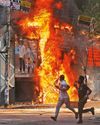
IN 2019, after the photos of 30 finalists of the Femina Miss India pageant came out in public, a massive social media backlash ensued, accusing the contest of being 'racist'. When the photos of these women-mostly with similar haircuts and fair skin-found space in one of the leading national newspapers with the headline, 'Who will be crowned Miss India this year?", Twitter went abuzz with a cry against such typecasting. One of the users shared the photo and wrote: "Why can't a Miss India be a dusky or a dark brown or darker chocolate brown? So much for the love of fair skin. I believe we are the most racist country in the world...!"
Notably, this was the same beauty pageant that crowned Priyanka Chopra the title of Miss India.
Anti-colour activist Muna Beatty, while talking to the news agency Reuters, said, "You have youngsters, kids watching this and thinking to themselves 'if I don't fit these criteria or this skin tone, then I'm not beautiful' and... 'I'm not good enough"."
Though these protests were confined within the walls of social media in 2019, the history of beauty contests and the women's movement suggest that since the 1960s, it has always been a matter of concern for the feminists who have been trying to fight the essentiality of beauty and its determination through the male gaze. The Miss World, Miss Universe, Miss International and Miss Earth contests, better known as the Big Four of beauty pageants, that have been around since 1951, have seen an evolution of the stipulations, regulations and the platform through the decades.
هذه القصة مأخوذة من طبعة March 21, 2024 من Outlook.
ابدأ النسخة التجريبية المجانية من Magzter GOLD لمدة 7 أيام للوصول إلى آلاف القصص المتميزة المنسقة وأكثر من 9,000 مجلة وصحيفة.
بالفعل مشترك ? تسجيل الدخول
هذه القصة مأخوذة من طبعة March 21, 2024 من Outlook.
ابدأ النسخة التجريبية المجانية من Magzter GOLD لمدة 7 أيام للوصول إلى آلاف القصص المتميزة المنسقة وأكثر من 9,000 مجلة وصحيفة.
بالفعل مشترك? تسجيل الدخول

Nomadland
All eyes are on President-elect Donald Trump and his policy on immigration

Far from Home
We have forgotten the plight of Afghans who fled to India, and continue to suffer

Bang Bang That Awful Sound
What happens when we listen closely to the soundscape of war?

Refugee Dilemma
For most Indian-origin Sri Lankan Tamils, who are victims of ethnic conflict and civil war, proving that they are not illegal migrants is a nearly impossible task

They Poured Fire on Us
The resilience of refugee women from Sudan, Ethiopia and Yemen in the face of war and displacement is remarkable

The Sound and the Fury
Iraqi poet, novelist, translator and scholar Sinan Antoon was born and raised in Baghdad.

The Day I Became a Woman
In a country where authorities have been directly engaging in the gruesome war against women for decades, artists like Nahid Hassanzadeh stand apart as a voice of dissent–a haunting reminder of the unwavering spirit of the rebellious Iranian women fighting against the Islamic Republic’s violent crackdown.

The Kite Runner
The official figure of civilian deaths in Afghanistan is a serious underestimate. It is unlikely that we will ever know the real cost of Afghan lives

American Patriot
Barring a few exceptions, Hollywood movies continue to be gung-ho about the United States' penchant for waging wars across the globe

The Hunters
How can Bangladesh's fractured society, burdened by layers of trauma, begin to heal?